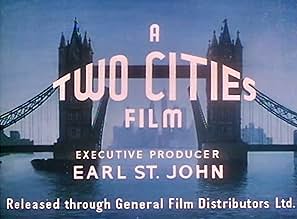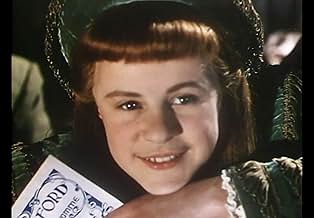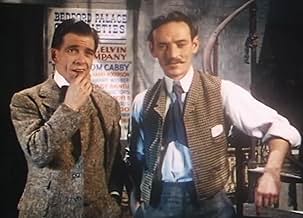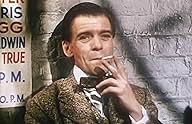Ajouter une intrigue dans votre langueIn the 1890s, Trottie True moves from bit theatre parts to stardom, and from balloonist Sid Skinner to more prominent men. She later wonders if Sid wasn't better after all, and seeks to find... Tout lireIn the 1890s, Trottie True moves from bit theatre parts to stardom, and from balloonist Sid Skinner to more prominent men. She later wonders if Sid wasn't better after all, and seeks to find out.In the 1890s, Trottie True moves from bit theatre parts to stardom, and from balloonist Sid Skinner to more prominent men. She later wonders if Sid wasn't better after all, and seeks to find out.
- Réalisation
- Scénario
- Casting principal
Tony Halfpenny
- Perce True
- (as Anthony Halfpenny)
Dilys Laye
- Trottie as a Child
- (as Dylis Lay)
Avis à la une
I was fortunate enough to be at the BFI Southbank in 2011 at a showing of Caravan starring Jean Kent in the presence of Jean Kent in what sadly was to be her last public appearance.Here she appears in a rather slight musical set in Victorian times.She shines through the material.
Jean Kent rises from being a child performer in Camden Town in the 1890s to a member of the Gaiety Theater chorus, to the Duchess of Wellwater in a storm-in-a-teacup tumultuous marriage. It's a slight programmer, eked out by Jean Kent's lively performer as a too-candid good girl and by good set and color design. The way cinematographer Harry Waxman shoots the movie, it winds up looking like a series of color rotogravures.
It's derived from one of the eccentric novels of S.J.Simon and Caryl Brahms. While it is not a great movie, Miss Kent's performance is excellent. She had gone on the stage at the age of ten (with her mother) and later worked in the chorus at London's famed Windmill Theater. Doubtless she based her performance on close observation.
It's derived from one of the eccentric novels of S.J.Simon and Caryl Brahms. While it is not a great movie, Miss Kent's performance is excellent. She had gone on the stage at the age of ten (with her mother) and later worked in the chorus at London's famed Windmill Theater. Doubtless she based her performance on close observation.
Jean Kent had everything, real acting ability, a lovely singing voice, and a beautiful face and figure. Only the British Film Industry was short sighted enough not to recognise a Lady who should have been our Number one Star. She was at her best in Trottie True, and I cannot understand why she wasn't snapped up by Hollywood. Only 8 years after this film she was supporting Marilyn Monroe in The Prince and the Showgirl, and still looking ravishing. She is the last surviving Gainsborogh Girl and it is shocking that she seems to have been totally forgotten by the Industry. I saw her at the National Film Theatre in 1999 when they showed Trottie True, and she talked about her career. After the film she came out into the foyer and signed every autograph and posed for photo's, a lovely Lady and a true star.
Trottie True tells the tale of a music hall girl who rises to stardom and soon has to navigate the pitfalls of having too many suitors, and choosing between love and her career.
Jean Kent does seem to be a talented actress but the movie is now dreadfully dated, although having a British movie made in colour in 1949 is quite a find. But the script and direction do not bring the film to life. Many scenes are rushed. There is no care taken in any scenes that show the character development. Even the musical numbers are mostly drawn up short without any respect to members of the audience who might just be enjoying the songs. Everything fades out or cuts at rampant speed, without a chance for the emotional side of the story to properly land. And there is a good story here, and in more skilled hands the characters could have really come to life. As it stands it's all just moving wallpaper. With sound. But much of the dialogue is delivered so fast that you miss a lot of what people are saying
The movie shows it's age most painfully in the songs, which Jean Kent trills her way through in an ear-splitting, high register that I am sure was all the rage when the movie was made, but it just hurt my ears.
The highlights are...well. just that it's a delightful, colourful, period relic. The ladies costumes are mind boggling, especially the never-ending parade of outstanding feathered hats. The acting is broad and unsubtle. I bet Jean Kent could have displayed some impressive depths of emotion but she isn't given a chance. It's the director's fault. There is a lot of plot here. Probably enough for 2 hours, but he filmed like he couldn't bear to spend an inch of celluloid more than was absolutely necessary on any shot or scene. Maybe in 1949, that was a genuine reason for brevity.
Jean Kent does seem to be a talented actress but the movie is now dreadfully dated, although having a British movie made in colour in 1949 is quite a find. But the script and direction do not bring the film to life. Many scenes are rushed. There is no care taken in any scenes that show the character development. Even the musical numbers are mostly drawn up short without any respect to members of the audience who might just be enjoying the songs. Everything fades out or cuts at rampant speed, without a chance for the emotional side of the story to properly land. And there is a good story here, and in more skilled hands the characters could have really come to life. As it stands it's all just moving wallpaper. With sound. But much of the dialogue is delivered so fast that you miss a lot of what people are saying
The movie shows it's age most painfully in the songs, which Jean Kent trills her way through in an ear-splitting, high register that I am sure was all the rage when the movie was made, but it just hurt my ears.
The highlights are...well. just that it's a delightful, colourful, period relic. The ladies costumes are mind boggling, especially the never-ending parade of outstanding feathered hats. The acting is broad and unsubtle. I bet Jean Kent could have displayed some impressive depths of emotion but she isn't given a chance. It's the director's fault. There is a lot of plot here. Probably enough for 2 hours, but he filmed like he couldn't bear to spend an inch of celluloid more than was absolutely necessary on any shot or scene. Maybe in 1949, that was a genuine reason for brevity.
Tottie True is a famous singer set in this late 19th century British film. She's not only very popular but beautiful...and lots of men are interested in her. But two are standouts....a poor guy who loves ballooning and a rich Marquess. Both ask her to marry and she agrees to marry the poor guy but then the rich guy offers...and she accepts again. This means letting down the poor guy gently. As the film progresses, you can't help but wonder if she might have been happier with the poor balloonatic.
This film looks nice and I have no major complaints. I just found the message to be a bit predictable. Otherwise, worth seeing and I found a high quality color copy of this on YouTube.
This film looks nice and I have no major complaints. I just found the message to be a bit predictable. Otherwise, worth seeing and I found a high quality color copy of this on YouTube.
Le saviez-vous
- AnecdotesDaphne Anderson's debut.
- ConnexionsFeatured in Best of British: Roger Moore (1999)
Meilleurs choix
Connectez-vous pour évaluer et suivre la liste de favoris afin de recevoir des recommandations personnalisées
Détails
- Durée1 heure 36 minutes
- Rapport de forme
- 1.37 : 1
Contribuer à cette page
Suggérer une modification ou ajouter du contenu manquant

Lacune principale
By what name was Trottie True (1949) officially released in Canada in English?
Répondre
































